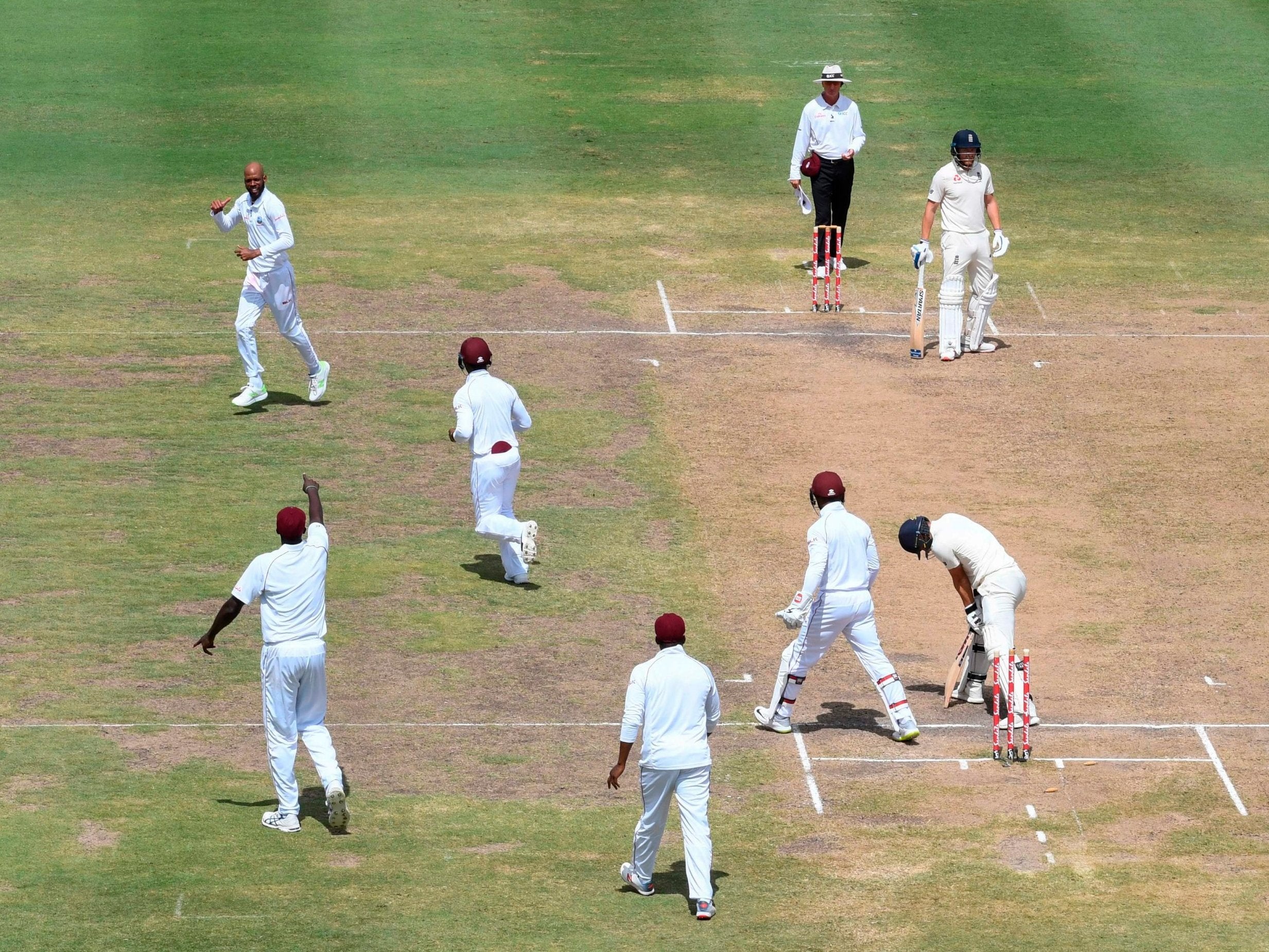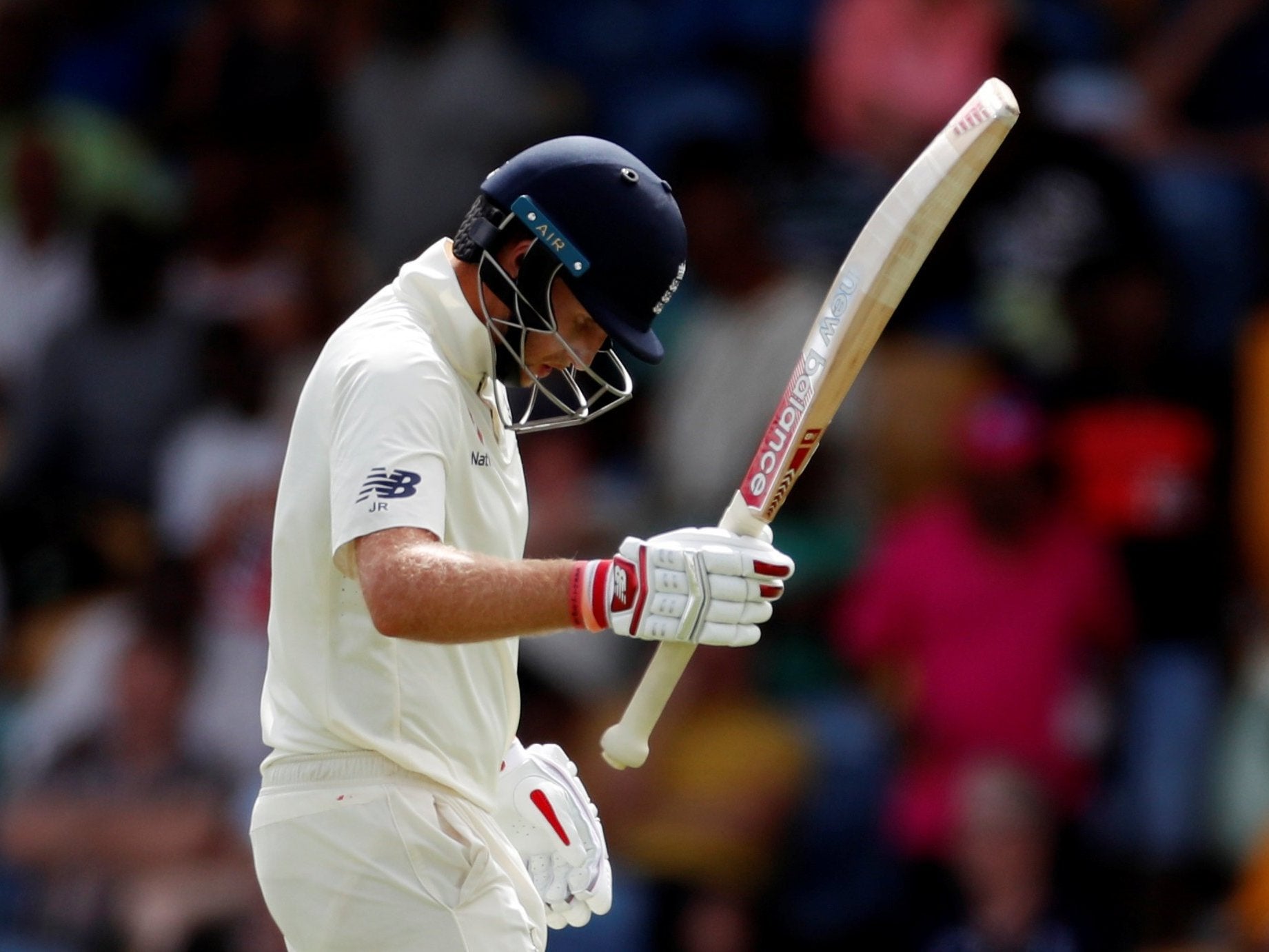England left looking for answers after shapeless tourists are schooled in Barbados
In every department - batting, bowling, fielding, wicket-keeping, selection, tactics, captaincy, preparation, reading of the conditions - the tourists were comprehensively outdone in the first Test

Your support helps us to tell the story
From reproductive rights to climate change to Big Tech, The Independent is on the ground when the story is developing. Whether it's investigating the financials of Elon Musk's pro-Trump PAC or producing our latest documentary, 'The A Word', which shines a light on the American women fighting for reproductive rights, we know how important it is to parse out the facts from the messaging.
At such a critical moment in US history, we need reporters on the ground. Your donation allows us to keep sending journalists to speak to both sides of the story.
The Independent is trusted by Americans across the entire political spectrum. And unlike many other quality news outlets, we choose not to lock Americans out of our reporting and analysis with paywalls. We believe quality journalism should be available to everyone, paid for by those who can afford it.
Your support makes all the difference.The sun sets quickly in Barbados. The shadows don’t so much creep as scamper across the outfield. As they packed up the food stalls and the boundary markers at the Kensington Oval, in the distance you could just make out the sparkling lights of the giant cruise ships moored in the dock. Darkness fell in an instant.
For England, the darkness had fallen much earlier than that. Only a few jubilant locals were still in the ground as the West Indies celebrated their remarkable victory in the first Test. Captain and double-centurion Jason Holder beamed a broad, tired smile. The unlikely eight-wicket hero Roston Chase posed for photographers, lounging on the grass as if this were his back garden.
Meanwhile, Joe Root was trying to put a brave face on the worst possible start to England’s year. There was to be no spoonful of sugar to accompany this rancid medicine. In every department - batting, bowling, fielding, wicket-keeping, selection, tactics, captaincy, preparation, reading of the conditions - his side had been schooled, and he knew it. A losing margin of 381 runs barely hinted at their ineptitude.
“We’re not going to hide behind anything,” he said. “We’re a far better side than that. We’ve shown that in the recent past. But it’s not the end of the world. It doesn’t mean we’re out of this series, and it doesn’t mean we’re a bad side. At no point have we underestimated or taken the West Indies team lightly.”
It was a shambles from start to finish. Indeed, you might argue that the shambles began well before the start, as England declined the West Indies’ request for a proper first-class warm-up game before the series, opting instead for two glorified two-day practice hits. Then they badly misjudged a Barbados pitch with a history of erratic bounce, opting for two spinners, and perhaps not even the right two spinners. For now England face up to the task of turning around a series they were expected to win comfortably, and perhaps even whitewash.
Root wouldn’t admit that England had erred with selection. “It’s easy to say that now,” he protested. “But the guys who did go out and play have not performed.” And the real reckoning, you suspect, will not be fully known until shortly before the toss in Antigua next Thursday, when Root hands Holder his team for the second Test. Too much change will whiff of panic. Too little and England will stand accused of indifference.
One man, at least, emerged from the Test with his reputation enhanced: opener Rory Burns, whose spirited 84 ran out of puff towards the end, but which may well have earned him an Ashes berth this summer. Prospective challengers only have three more Tests between now and August to dislodge a player whose range of strokes, willingness to attack the bad ball and judgment of tempo are beginning to impress. “He showed he had the ability and class to play at this level,” Root said.
If Burns tightened his grip on a Test place, his opener Keaton Jennings is hanging on by fingers. A sketchy 17 in England’s first innings was hardly mitigated by the fact that it was the top score; his tortuous 14 in the second innings - which took him more than two hours - will give the selectors plenty to ponder.
A charitable view would be that if the job of an opener is to weather the most dangerous period of the innings, see off the new ball and enable his colleagues further down the order, then he did a useful job. Equally, a platform without runs or momentum is not really any sort of a platform at all, and whether in defence or attack, Jennings simply seems too limited against high-quality pace. Currently he averages 44 in Asia, and 17.5 everywhere else.

Jennings will almost certainly get another go in Antigua, in which case it’s not out of the question that England could field an unchanged side. If that’s unlikely, the top eight at least will probably remain in place, although on current form Ben Foakes deserves to move ahead of Moeen Ali into No 7. Moeen has been batting abysmally of late, and if a move down to No 8 frees him up a little, then it may be worth it. Sam Curran had a poor game but can expect perseverance; if Rashid is dropped, his replacement in Antigua will be Jack Leach if it looks like turning, Stuart Broad if it doesn’t.
And then we come to the linchpin of the side, albeit a curiously becalmed one. Ben Stokes hasn’t made a Test score of note since fracas in Bristol 16 months ago, and more tellingly, his strike rate in both red- and white-ball cricket has declined sharply. It may well be that the chastening experience of Bristol and its aftermath has taught him a few life lessons that have seeped into his cricket. He wants to be maturer, more responsible, someone you can rely on. This may explain why his batting seems to have gone into its shell while his bowling spells seem longer and more relentless than ever. In either case, you could interpret it as a form of exculpatory self-denial.

But at what point will Root need to manage him? A match workload of more than 50 overs in three days is clearly not sustainable over a long term for a player who also bats at No 5 and throws himself around in the field. “You know what he’s like,” Root argued. “It’s so difficult to take the ball off him. Of course he’ll be stiff and sore for the next couple of days. But he’ll be desperate to get out there.”
In a way, Stokes’ travails reflect England’s more broadly: a team still finding their roles, still putting down roots, still adapting to their shifting cricketing identities. Perhaps it is no real surprise that they flourish one month and flounder the next: currently, this is a team without reference points, without a horizon, shapeless, formless, a collage on shifting walls. The player uncertain of his role looks around the dressing room and sees only more colleagues in the same predicament.
They still need time. Root still needs time. Test cricket is a hard enough game to master even when you’re not being shuffled in and out of the side, shuffled up and down the order. After the upheaval of the last two years, a little continuity would serve England well right now. As any visitor to Barbados will be able to tell you, it takes the sun a lot longer to rise than it does to set.
Join our commenting forum
Join thought-provoking conversations, follow other Independent readers and see their replies
Comments